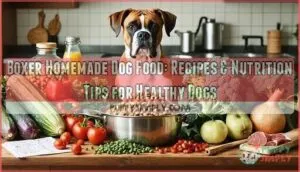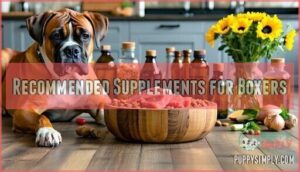This site is supported by our readers. We may earn a commission, at no cost to you, if you purchase through links.

This approach works particularly well for boxers since they’re prone to food allergies and digestive issues that respond better to fresh, whole ingredients.
You can customize protein sources, adjust portions for your boxer’s high energy requirements, and often save money compared to premium commercial foods.
The key lies in balancing proteins, healthy fats, and carbohydrates while ensuring proper vitamin and mineral content.
Getting the nutritional ratios right requires understanding your boxer’s unique dietary requirements and metabolism.
Table Of Contents
- Key Takeaways
- Benefits of Homemade Dog Food for Boxers
- Nutritional Guidelines for Boxers
- Homemade Dog Food Recipes for Boxer Puppies
- Recommended Supplements for Boxers
- Homemade Dog Food Delivery Service for Boxers
- Health Dietary Changes for Boxers
- Calorie Requirements for Boxers
- Tips for Making Homemade Dog Food for Boxers
- Boxer Raw Diet (BARF) and Its Benefits
- Frequently Asked Questions (FAQs)
- What food is best for Boxer dogs?
- What do vets think of homemade dog food?
- What not to feed a Boxer dog?
- Are carrots good for Boxer dogs?
- How do I transition my Boxer from commercial food?
- Can pregnant or nursing Boxers eat homemade food?
- What kitchen equipment is needed for preparation?
- How long does homemade dog food stay fresh?
- Are there specific foods toxic to Boxers?
- Conclusion
Key Takeaways
- You control every ingredient in homemade meals, reducing allergy risks and avoiding harmful additives for your Boxer.
- You’ll boost your Boxer’s health with balanced proteins, healthy fats, and vitamins you tailor to their unique needs.
- Making your own dog food often costs less than buying premium commercial brands and lets you adjust portions for your dog’s energy level.
- Always focus on nutrient balance, use safe ingredients, and consult your vet to make sure your Boxer’s meals meet all their nutritional requirements.
Benefits of Homemade Dog Food for Boxers
You’ll give your Boxer better nutrition and longer life when you make their food at home instead of buying commercial kibble.
Homemade meals let you control every ingredient, avoid harmful additives, and customize recipes for your dog’s specific health needs.
You can ensure your dog receives the best possible care by providing homemade meals tailored to their unique requirements.
Nutritional Benefits of Homemade Dog Food
When you craft homemade meals for your boxer, you’re taking control of their nutritional destiny.
You’re shaping your Boxer’s health destiny with every homemade meal you prepare.
Quality ingredients mean better health outcomes than processed alternatives.
Here’s what homemade boxer nutrition delivers:
- Protein Sources – Fresh chicken, beef, and fish provide complete amino acid profiles
- Healthy Fats – Omega-3s from fish oil support coat shine and joint health
- Nutrient Balance – You control exact ratios of vitamins and minerals
- Dietary Fiber – Vegetables aid digestion and prevent bloating issues
- Vitamin Supplements – Fill nutritional gaps commercial foods often miss
Natural dog food eliminates artificial preservatives and fillers that can trigger allergies.
Freshness and Taste Advantages
Fresh ingredients in homemade dog food deliver unmatched taste and nutritional benefits that commercial kibble simply can’t match.
When you prepare meals using fresh ingredients, you’re preserving natural flavors and aromas that make mealtime exciting for your Boxer.
| Fresh Advantage | Homemade Benefit | Impact on Boxer |
|---|---|---|
| Nutrient Retention | Vitamins stay intact | Better absorption |
| Flavor Enhancement | Natural taste preserved | Increased appetite |
| Aroma Preservation | Enticing smells remain | Keen eating behavior |
| Texture Variety | Multiple consistencies | Dental health support |
| Quality Control | You choose ingredients | Safer, healthier meals |
Homemade recipes using natural dog food ingredients maintain their nutritional value better than processed alternatives.
Your Boxer will notice the difference immediately through improved enthusiasm at mealtime and better overall satisfaction with their food.
Cost-effectiveness of Homemade Diet
Beyond taste appeal, you’ll find significant Food Savings when preparing homemade dog food for your Boxer.
Budget Planning shows homemade meals cost 30-50% less than premium commercial options.
Diet Costs decrease dramatically when buying ingredients in bulk.
Cost Comparison reveals that Homemade Value extends beyond immediate savings – you’re investing in your Boxer’s long-term health while controlling exactly what goes into their bowl.
Nutritional Guidelines for Boxers
Your Boxer’s dietary needs form the foundation for peak health.
Adult Boxers require approximately 20 calories per pound of body weight daily, with protein sources comprising 25-30% of total calories.
Healthy fats should account for 10-15%, while carbohydrates fill the remaining percentage.
Nutrient balance depends on your dog’s activity level, age, and weight.
Meal planning becomes straightforward when you focus on lean meats like chicken, beef, or fish for protein sources.
Vitamin supplements may be necessary to meet specific Boxer nutritional needs, particularly calcium and omega-3 fatty acids for joint health.
For a balanced diet, consider consulting homemade dog food guidelines to guarantee your Boxer receives the necessary nutrients.
Homemade Dog Food Recipes for Boxer Puppies
Growing Boxer puppies have unique nutritional needs that differ substantially from adult dogs. Your puppy requires higher protein levels and more calories per pound to support rapid growth and development.
When creating homemade Boxer recipes, aim for 28-30% protein from quality sources like ground chicken, turkey, or lean beef. Include digestible carbohydrates such as sweet potatoes and brown rice for energy. Add steamed vegetables like carrots and green beans for vitamins and fiber.
A simple recipe idea combines 1 pound ground turkey, 1 cup cooked quinoa, ½ cup steamed carrots, and ¼ cup green beans. Cook the meat thoroughly and mix all ingredients when cooled.
Establish a consistent feeding schedule with three meals daily until six months old, then switch to twice daily. Proper meal planning guarantees nutrient balance while supporting healthy growth. Monitor your puppy’s weight and adjust portions accordingly to maintain ideal body condition throughout this critical development phase.
Considering the benefits of homemade dog food is essential for a puppy’s overall health and development.
Recommended Supplements for Boxers
The right supplements can make all the difference in your Boxer’s health journey. While homemade dog food provides excellent nutrition, targeted supplements fill specific gaps that support your dog’s unique needs.
Smart nutrition starts with understanding your dog’s unique requirements and filling the gaps that even the best homemade meals might miss.
Essential boxer supplements include:
- Joint Care Support – Glucosamine and chondroitin work together at 15 mg per pound daily, helping maintain healthy cartilage and reducing arthritis risk in these athletic dogs
- Heart Health Protection – Taurine supplementation prevents dilated cardiomyopathy, a serious condition Boxers face more than other breeds
- Digestive Balance – Probiotics containing Lactobacillus acidophilus keep your dog’s gut healthy and improve nutrient absorption from homemade meals
Omega 3 fatty acids from fish oil deliver anti-inflammatory benefits at 20-55 mg/kg EPA/DHA daily. Vitamin D supports bone strength, while canine nutritional requirements often need additional calcium-phosphorus balance at 1.2:1 ratio.
Dog food supplements shouldn’t replace quality ingredients, but they bridge nutritional gaps. Dog supplements work best when a dog nutritionist evaluates your recipe first. Always consult your vet before starting any supplement program to confirm proper dosing for your Boxer’s specific needs. Additionally, maintaining healthy joints requires understanding joint care supplements to prevent potential issues.
Homemade Dog Food Delivery Service for Boxers
Many busy Boxer owners turn to homemade dog food delivery services when they want premium nutrition without the time commitment.
These specialized companies create custom meal plans using fresh ingredients that meet your Boxer’s specific needs.
Quality delivery services prioritize food safety through proper handling, cooking, and packaging.
They’ll work with veterinary nutritionists to confirm recipes provide balanced nutrition your Boxer requires.
Most offer flexible delivery options – weekly, bi-weekly, or monthly shipments that fit your schedule.
When choosing a service, look for companies that customize portions based on your dog’s weight, age, and activity level.
The best providers let you specify dietary restrictions and preferences while maintaining proper dog nutrition standards.
These services typically cost more than making food yourself, but they save significant time on meal planning and preparation.
You’ll receive pre-portioned meals with clear feeding instructions, making it simple to provide consistent homemade recipes.
Before starting any delivery service, discuss your boxer diet plans with your veterinarian to verify the homemade dog food for Boxers meets all nutritional requirements.
Health Dietary Changes for Boxers
While homemade delivery services offer convenience, you can achieve better health outcomes by making targeted dietary changes yourself.
Diet planning becomes your roadmap to addressing specific boxer health concerns through canine nutrition.
Start by eliminating common allergens like corn, wheat, and soy from your boxer’s meals.
These ingredients often trigger food allergies and digestive issues.
Your boxer homemade dog food should focus on nutrient balance with high-quality proteins making up 40-50% of each meal.
Meal prep becomes easier when you understand your boxer’s needs.
Include lean meats, sweet potatoes, and leafy greens while avoiding processed ingredients.
Raw dog food can benefit some boxers, but cooked healthy dog food works equally well when properly balanced.
Monitor your boxer’s response to dietary changes.
Weight management, coat quality, and energy levels tell you if your boxer diet adjustments are working.
Remember that boxer health improves gradually, so give new recipes 4-6 weeks before making additional changes to see positive results and ensure a healthy dog with a good coat quality and optimal weight management.
Calorie Requirements for Boxers
Your Boxer’s daily calorie needs depend on several key factors.
Adult Boxers typically require 20 calories per pound of body weight daily.
A 70-pound Boxer needs approximately 1,400 calories, while a 60-pound dog requires 1,200-1,500 calories based on activity level.
Puppies need about 55 calories per pound during rapid growth phases.
Senior Boxers require fewer calories, around 900-1,100 daily.
Spayed or neutered dogs need 10-20% fewer calories than intact Boxers.
Monitor your dog’s body condition and adjust calorie intake accordingly to maintain ideal weight.
Understanding the best dog foods is vital for providing a balanced diet that meets your Boxer’s nutritional needs.
Tips for Making Homemade Dog Food for Boxers
Successfully preparing boxer homemade dog food requires attention to four key areas that’ll keep your furry friend healthy and happy. Getting the basics right means your Boxer will thrive on homemade meals.
Food Safety forms the foundation of safe meal preparation. Always cook meats to 165°F, wash vegetables thoroughly, and keep preparation areas clean. Store finished meals in the refrigerator for up to three days or freeze portions for longer storage.
Meal Planning helps you stay organized and consistent. Prepare several days’ worth of meals at once, portion them into containers, and label with dates. This approach saves time while guaranteeing your Boxer gets regular, balanced nutrition.
Recipe Customization allows you to adjust ingredients based on your dog’s specific needs. If your Boxer has allergies, substitute problematic ingredients with safe alternatives. Always switch gradually from commercial food over 7-10 days.
- Monitor portion sizes based on your Boxer’s weight and activity level
- Include supplements like fish oil and calcium as recommended by your vet
- Keep detailed feeding logs to track your dog’s response to new recipes
Following proper Feeding Guidelines and maintaining Nutrient Balance guarantees the best health outcomes. Using reliable dog food recipes is vital for a balanced diet.
Boxer Raw Diet (BARF) and Its Benefits
The BARF diet (Biologically Appropriate Raw Food) offers your Boxer a natural eating approach that mimics what dogs consumed before commercial kibble existed.
This raw feeding method can improve digestion, boost energy levels, and promote healthier skin and coat compared to processed alternatives, following a Biologically appropriate approach.
Health Benefits of BARF
BARF diet benefits your Boxer’s health through improved digestion and enhanced immune function.
Raw feeding increases beneficial gut bacteria diversity, reducing diarrhea by significant margins while promoting firmer stools.
Your dog’s coat becomes shinier within 30 days due to natural omega-3 fatty acids in raw nutrition.
Canine wellness improves as white blood cell counts normalize, strengthening disease resistance naturally, which enhances overall immune function.
Raw Diet for Boxers
Starting a raw feeding program for your Boxer requires careful diet planning and attention to raw ingredients.
You’ll need to establish a consistent feeding schedule that includes muscle meat, organ meat, and raw bones.
BARF diet followers often choose grain-free diets to mirror ancestral eating patterns.
Your Boxer’s raw diet should contain 80% muscle meat, 10% organs, and 10% bones for proper Boxer nutrition and ideal health benefits.
Homemade Vs Commercial Food
While 73% of dogs maintain stable weight on homemade diets, only 38% of online homemade Boxer recipes meet AAFCO nutrition standards.
Commercial dog food provides consistent nutrition facts and pet safety through regulation, but homemade dog food for Boxers offers superior ingredient control and food quality.
Diet comparison shows homemade Boxer recipes excel in customization, while commercial options guarantee balanced nutrition without extensive planning.
For peak nutrition, understanding dog food recipes is essential for pet owners to achieve superior ingredient control.
Frequently Asked Questions (FAQs)
What food is best for Boxer dogs?
High-quality protein from chicken, beef, or fish should make up 25-30% of your Boxer’s diet.
You’ll want balanced homemade meals with healthy fats, whole grains, and vegetables, but consult your vet first.
What do vets think of homemade dog food?
Vets generally express cautious optimism about homemade dog food when it’s properly planned.
They appreciate the ingredient control but worry about nutritional imbalances, emphasizing you’ll need professional guidance to guarantee complete nutrition.
What not to feed a Boxer dog?
Never feed your Boxer chocolate, grapes, raisins, onions, garlic, avocado, or macadamia nuts—they’re toxic and dangerous. Also avoid artificial sweeteners, cooked bones, and high-fat foods that can cause pancreatitis.
Are carrots good for Boxer dogs?
Like Bugs Bunny’s favorite snack, carrots offer your Boxer excellent nutrition.
They’re packed with beta-carotene, fiber, and vitamins that support eye health and digestion.
You can serve them raw or cooked as healthy treats.
How do I transition my Boxer from commercial food?
Gradually mix increasing amounts of homemade food with decreasing commercial food over 7-10 days.
Start with 25% homemade, then 50%, 75%, and finally 100%.
Monitor your dog’s digestion and consult your vet throughout this conversion process.
Can pregnant or nursing Boxers eat homemade food?
Like a careful gardener tending delicate seedlings, you’ll need extra precision when feeding pregnant or nursing Boxers homemade food.
These dogs require increased calories and nutrients, so consult your vet immediately to guarantee proper supplementation and avoid deficiencies, which is crucial for their health and wellbeing, making proper supplementation essential.
What kitchen equipment is needed for preparation?
You’ll need basic kitchen tools: a large pot for cooking proteins, steamer for vegetables, cutting board and knife for prep, measuring cups for portions, and storage containers for batch preparation.
How long does homemade dog food stay fresh?
Homemade dog food stays fresh in the fridge for up to four days if you store it in a sealed container.
For longer shelf life, freeze leftovers—just label each batch and thaw before serving to your pup.
Are there specific foods toxic to Boxers?
Steer clear of chocolate, grapes, raisins, onions, garlic, avocado, and macadamia nuts—the usual troublemakers for dogs.
Even a small bite can act like poison, harming your Boxer’s heart, kidneys, or nervous system quickly.
Conclusion
They say, "You are what you eat," and your boxer is no different.
Choosing boxer homemade dog food gives you control, letting you adapt each meal to meet your dog’s unique needs.
You’ll optimize nutrition, minimize allergy risks, and manage weight with ease.
By following proper guidelines, your boxer will enjoy balanced meals, vibrant health, and plenty of energy.
Every meal you serve brings you closer to your healthy, happy boxer—and peace of mind for you.
- https://www.houndsy.com/blogs/modern-tails/homemade-dog-food-for-boxers-a-nutritional-guide-for-your-furry-friend
- https://www.akc.org/expert-advice/nutrition/choosing-ingredients-homemade-dog-food/
- https://stellanspice.com/balanced-dog-food/
- https://www.whole-dog-journal.com/food/home_prepared/how-to-make-your-own-dog-food/
- https://www.reddit.com/r/Boxer/comments/1gz1kz3/homemade_dog_food_for_my_boxershepherd/












